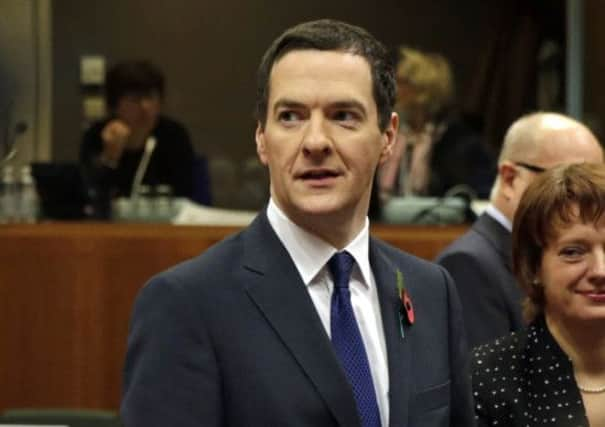Tory EU troubles as Osborne and May battle for support


As Chancellor George Osborne struggled to convince even his own party that he had won an EU bill victory, Home Secretary Theresa May was preparing for a European rebellion from Tory MPs over her plans to opt back into the European Arrest Warrant.
Mr Osborne’s Treasury was desperately trying to convince commentators that the UK’s EU rebate would not automatically have applied to the £1.7bn surcharge handed to the UK last month.
Advertisement
Hide AdAdvertisement
Hide AdThe Chancellor told reporters in Brussels he had secured a deal in which the bill is reduced to £850 and would not be paid until September.
Mr Osborne added: “I can say this - instead of footing the bill, we have halved the bill, we have delayed the bill, we will pay no interest on the bill. And if there are mistakes in the bill we will get our money back. We have also changed permanently the rules of the European Union so this never happens again.”
Prime Minister David Cameron backed him, saying: “I said we wouldn’t pay £1.7 billion on December 1. We’ve now halved the bill and will pay nothing until next July. We’re delivering for Britain.”
That sense of achievement was undermined when other EU finance ministers said that as far as they were concerned, all that had happened was the UK had applied its long standing rebate to the bill.
Advertisement
Hide AdAdvertisement
Hide AdAustria’s Hans Joerg Schelling said: “Whether the money is to be paid in instalments or as a lump sum is a discussion we can have. But the amount cannot be put in question.”
Within hours of the announcement even Mr Osborne’s own supporters began to question the deal. Senior Conservative MEP Daniel Hannan said he had “lost patience with my party leaders on the EU issue.”
He added: “The rebate is a proportion of the difference between what we pay and what we get back. It applied throughout the period in question. It’s not credible to claim that it was ever in doubt. This is, evidently, how EU supporters plan to fight the referendum. Dishonestly.”
While the budget row raged, the Home Secretary was readying for the next stage in the Tory EU conflict.
Advertisement
Hide AdAdvertisement
Hide AdOn Monday Mrs May will seek to take the UK back into the controversial European Arrest Warrant with a Commons vote.
The EAW is one of 35 European Union police and criminal justice measures the Government wants to opt back in to, with MPs expected to approve the package as a whole.
But the chairmen of three influential Commons committees have criticised the decision to hold a single vote, arguing that the Commons should be able to decide on the EAW separately rather than as a “take-it-or-leave-it package”.
Mrs May and the PM face a backbench revolt on the EAW, and the Government has resisted calls to have more than one potentially difficult vote on the EU measures.
Advertisement
Hide AdAdvertisement
Hide AdSome Tories oppose the EAW because of concerns that it is too easy for UK citizens to be extradited on relatively minor charges to countries where they may have no guarantee of a fair trial.
The vote could see dozens of Tory MPs defy the party leadership to oppose the measure, but Home Secretary Mrs May was contacting wavering backbenchers in an attempt to secure their support.
Tory Sir Bill Cash, chairman of the Commons European Scrutiny Committee, said: “We do not accept that the motion tabled by the Government for Monday’s debate fulfils the Government’s commitment to engage constructively with Parliament, or its undertaking to hold a further vote in both Houses of Parliament before making a formal application to rejoin any measures.
“We expect Parliament to have a further opportunity to vote on the full 35 measures on the basis of an amendable motion or motions.”
Advertisement
Hide AdAdvertisement
Hide AdLabour’s Keith Vaz, who chairs the Home Affairs Committee also criticised the vote move, as did Justice Committee chairman Liberal Democrat Sir Alan Beith who said its view was “that the House should have the opportunity to vote.”